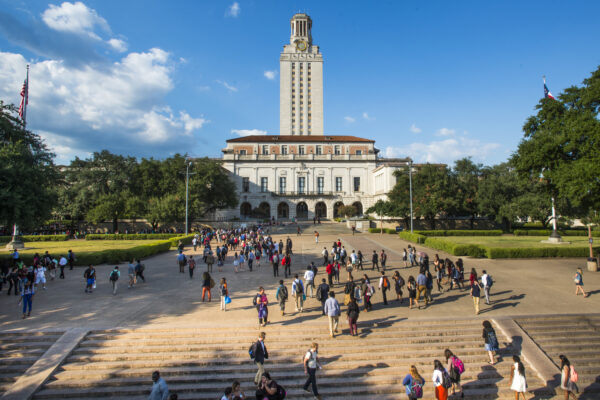AUSTIN, Texas — To achieve its goal of becoming the highest-impact public university in the world, The University of Texas at Austin is committed to creating a bold and actionable strategic plan and making long-term investments in its people, processes and tools.
To this end, the university is seeking authorization from The University of Texas System Board of Regents to extend its contract with Bain & Company, the external partner that has been working with the university’s faculty, staff and leaders to create the first phase of UT’s new strategic direction.
Pending board approval, the university will invest a one-time consulting expense with Bain. About two-thirds of the expense will be directed toward improving procurement, information technology and other operations. The other third will support the strategic plan and a new university-wide strategy and action plan for diversity, equity and inclusion (DEI).
The university anticipates that money saved through these efforts will more than pay for the consulting investment while helping fund long-term initiatives to benefit UT Austin students, faculty members and staffers.
The overall planning efforts mark the most comprehensive review of UT Austin’s strategy and vision since the Commission of 125 in 2004.
“UT Austin faces an incredibly rare opportunity to position itself to become the world’s highest-impact public university,” said President Jay Hartzell. “Our faculty leaders have been gathering input from across our community, relying on the depth and diversity of talent at our disposal, with great support from Bain. We are already down the road to success with the development of our strategic direction. This new phase will allow us to launch a more detailed plan and process as we accelerate toward our goals.”
Improvements in procurement processes, including capital projects, are expected to lead to major cost-savings. The university spends $1 billion a year on goods and services. Bain’s one-time fee is less than 2% of this amount and is expected to lead to smarter, faster procurement processes yielding long-term savings.
The university will also explore potential revenue growth opportunities through the strategic planning process. In addition to this work, Bain will help the university develop processes to better use data for financial decisions and to advance faculty and staff development through changes such as a new campus-wide faculty sabbatical program.
“By investing now, we can achieve great things in both the near and long term,” said Executive Vice President and Provost Sharon Wood. “Operational shortcomings, especially in IT and purchasing, affect all aspects of our mission. By improving the underlying processes and tools that enable teaching and research, we will use resources more strategically and maximize impact.”
The cumulative cost of the Bain contract, if approved, will be $20,069,500, including work already completed. The cost is in line with what other universities have paid working with external partners of this caliber on projects of similar size and scope.
UT Austin faculty members and leaders are directing the overall planning effort through an advisory committee. Bain does not make decisions on the future of the university but brings outside expertise from past strategic work with peer universities such as the University of California at Berkeley, the University of North Carolina at Chapel Hill, and Cornell University.
“At this critical moment of change and opportunity, President Hartzell has set a deliberate and ambitious plan in motion to ensure a bold future for UT,” said Lauren Ancel Meyers, professor in the departments of Integrative Biology and Statistics & Data Sciences, and a member of the advisory committee. “Led by visionary thinkers and doers from across campus, and guided by Bain’s experienced team, we are charting strategic directions that will enrich the Longhorn experience and amplify the impact of our faculty, staff, students and alumni.”
The aim of Bain’s work on DEI will be to help the newly established DEI steering committee, led by the Division of Diversity and Community Engagement, develop an integrated, university-wide plan with measurable supporting goals and initiatives. The final plan will build on DEI efforts already underway, such as university initiatives since the summer of 2020 and the recent creation of the Hispanic Serving Institution Steering Committee within the Office of the President.
“This effort signals a long-term commitment by the university to take bold steps to continue building a welcoming and inclusive campus community that is accessible to and for everyone,” said Vice President for Diversity and Community Engagement LaToya Smith. “We’ve engaged with and continue to listen to campus and community voices. The resounding expectation is that we cultivate a university community of understanding and compassion, where everyone belongs and is empowered to be their authentic selves.”
The advisory committee completed the first phase of work with broad input from across the university community through interviews, focus groups, surveys and small group sessions with campus stakeholders. Faculty leaders are continuing to seek community input through a variety of methods, including an input form on the Strategic Plan website.




